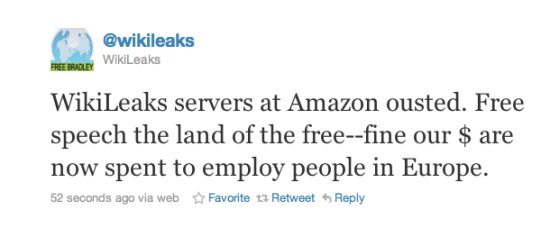Amazon, which briefly hosted WikiLeaks when the whistleblower site left its Swedish web host PRQ — which had been the target of government raids in October — will no longer be hosting WikiLeaks, according to a statement issued by the office of Senator Joseph Lieberman. WikiLeaks, which had been the subject of numerous DDoS attacks since Sunday, some of which it said emanated from China, will be returning to PRQ.
Amazon’s hosting of WikiLeaks wasn’t a show of solidarity; it was a business matter with a self-service neutral data carrier, Amazon Web Services, which is not the same thing as the e-commerce site. That said, based on Senator Lieberman’s statement, which praises Amazon for its “decision to cut off Wikileaks now”, would seem to indicate that it has caved in the face of what would have been an inevitable barrage of political pressure.
This morning Amazon informed my staff that it has ceased to host the Wikileaks website. I wish that Amazon had taken this action earlier based on Wikileaks’ previous publication of classified material. The company’s decision to cut off Wikileaks now is the right decision and should set the standard for other companies Wikileaks is using to distribute its illegally seized material. I call on any other company or organization that is hosting Wikileaks to immediately terminate its relationship with them. Wikileaks’ illegal, outrageous, and reckless acts have compromised our national security and put lives at risk around the world. No responsible company – whether American or foreign – should assist Wikileaks in its efforts to disseminate these stolen materials. I will be asking Amazon about the extent of its relationship with Wikileaks and what it and other web service providers will do in the future to ensure that their services are not used to distribute stolen, classified information.
PRQ, which also hosts BitTorrent file-sharing site The Pirate Bay, is unlikely to buy into such arguments; however, its continued hosting services do not protect WikiLeaks from attacks, which were what prompted WikiLeaks to move to Amazon Web Services in the first place.
Update, 2:52pm: WikiLeaks has just issued the following tweet criticizing Amazon:

Update, 12/3: Amazon has posted the following response, which contradicts Lieberman’s claim that the government had caused Amazon to agree to stop hosting WikiLeaks:
There have been reports that a government inquiry prompted us not to serve WikiLeaks any longer. That is inaccurate.
There have also been reports that it was prompted by massive DDOS attacks. That too is inaccurate. There were indeed large-scale DDOS attacks, but they were successfully defended against.
Amazon Web Services (AWS) rents computer infrastructure on a self-service basis. AWS does not pre-screen its customers, but it does have terms of service that must be followed. WikiLeaks was not following them. There were several parts they were violating. For example, our terms of service state that “you represent and warrant that you own or otherwise control all of the rights to the content… that use of the content you supply does not violate this policy and will not cause injury to any person or entity.” It’s clear that WikiLeaks doesn’t own or otherwise control all the rights to this classified content. Further, it is not credible that the extraordinary volume of 250,000 classified documents that WikiLeaks is publishing could have been carefully redacted in such a way as to ensure that they weren’t putting innocent people in jeopardy. Human rights organizations have in fact written to WikiLeaks asking them to exercise caution and not release the names or identities of human rights defenders who might be persecuted by their governments.
We’ve been running AWS for over four years and have hundreds of thousands of customers storing all kinds of data on AWS. Some of this data is controversial, and that’s perfectly fine. But, when companies or people go about securing and storing large quantities of data that isn’t rightfully theirs, and publishing this data without ensuring it won’t injure others, it’s a violation of our terms of service, and folks need to go operate elsewhere.
We look forward to continuing to serve our AWS customers and are excited about several new things we have coming your way in the next few months.
— Amazon Web Services








Published: Dec 1, 2010 02:41 pm